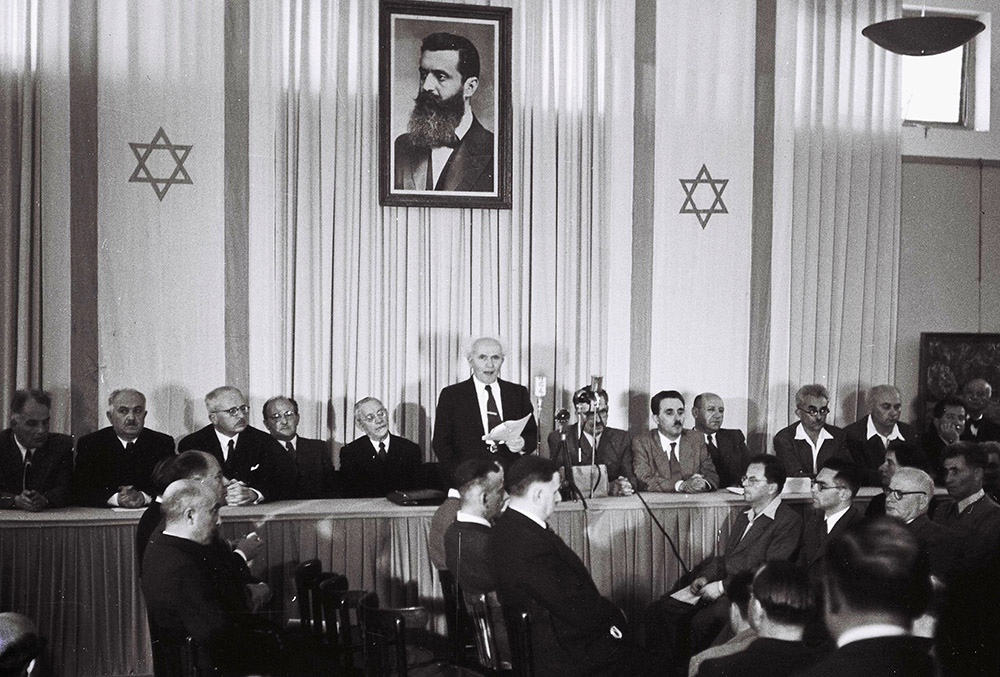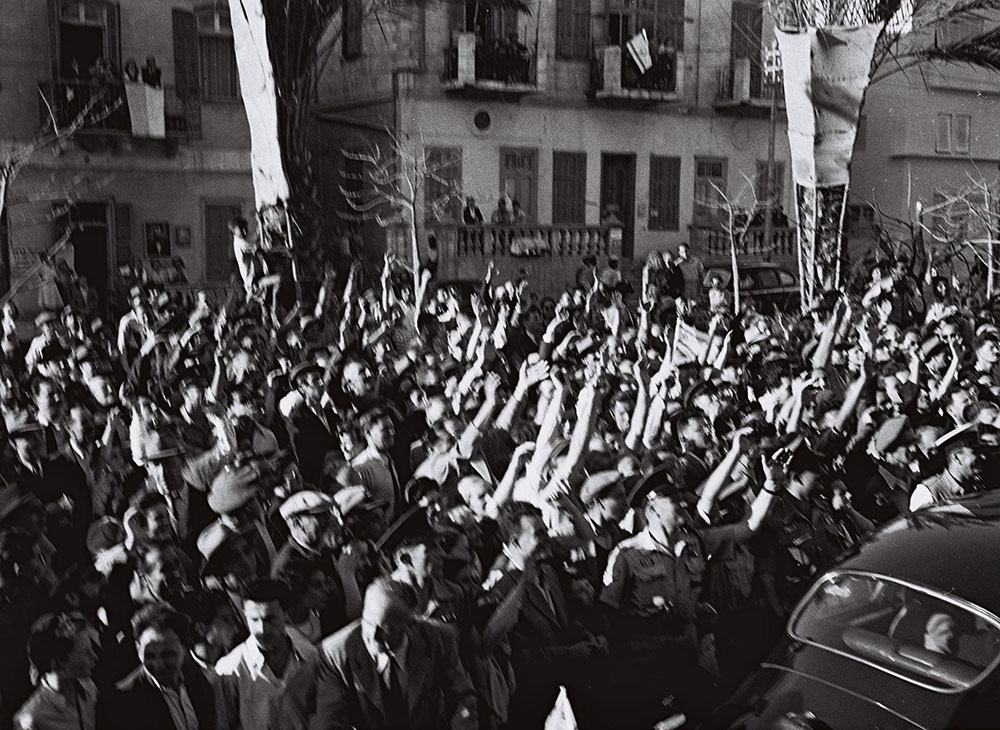
David Ben-Gurion publicly pronounces the Declaration of the State of Israel on May 14, 1948, in Tel Aviv. (Wikimedia Commons/Israel Ministry of Foreign Affairs)
At sundown tomorrow, Israel will begin celebrating its 75th anniversary as an independent nation in the modern era. Israel was then and remains today the only democracy in the region, which is, in itself, a reason to celebrate. Unlike those early days after David Ben-Gurion declared the nation's independence, today Israel is far more secure, having negotiated peace agreements with its two largest neighbors, Egypt and Jordan.
It is difficult to put ourselves and our imagination back in time to 1948. Jewish settlers during the First Aliyah had lived in Israel since the last two decades of the 19th century, settling in what was still the Ottoman Empire. Zionism became a political movement in those same years and the Second Aliyah brought more Jewish settlers in the early decades of the 20th century.
After World War I, Britain established the Emirate of Transjordan for the Hashemite family and kept the rest of Palestine under a direct mandate with Muhammad Amin al-Husayni serving as Mufti, or chief Muslim religious official, in Jerusalem. He would be exiled by the British in 1936 and went on to collaborate with the Nazis during World War II.
Then there was the Shoah. Its survivors spoke with a moral authority that is unique in modern history and speaks to us still: There is a moral authority to Jewish fears that we in the West will be only too willing to stand aside when people seek to exterminate the Jews. Is there a country in Europe with no history of antisemitism? With the possible exception of Denmark, was there a country that did not furnish a significant supply of collaborators during the Shoah?
The British decided to abandon their mandate after the war, and the United Nations voted to divide the land between Jews and Arabs. The Jews formally accepted the proposal and the Arabs did not.
All this was the backdrop to the declaration of Israeli independence, but there was one other important religious and cultural component to the making of modern Israel, the history of ancient Israel.

Citizens outside cheer during the ceremony to sign Israel's Declaration of Independence on May 14, 1948, in Tel Aviv. (Wikimedia Commons/Israel Government Press Office/Hans Pinn)
In 1947, David Ben-Gurion spoke to the United Nations. "Three hundred years ago, a ship called the Mayflower left for the New World. ... [Its] landing on Plymouth Rock was one of the great historical events ... in the history of America. ... I'd like to ask the Americans: Do they know what date the Mayflower left port in England? How many people were on the boat? Who were their leaders? What kind of food did they eat on the boat?" Ben-Gurin asked.
"More than 3,300 years before the Mayflower set sail, the Jews left Egypt. Any Jewish child, whether in America or Russia, Yemen or Germany, knows that his forefathers left Egypt at dawn on the 15th of Nissan," he said. "Their belts were tied and their staffs were in their hands. They ate matzot and arrived at the Red Sea after seven days. ... Jews worldwide still eat matza for seven days from the 15th of Nissan, and retell the story of the Exodus, concluding with a fervent wish 'Next year in Jerusalem.' "
Historical consciousness was not worth much in 1948, certainly not enough to tip the balance when facing geopolitical power on the opposite side of the scales. The part of Poland from which my grandmother came was ceded to White Russia when Stalin shifted the entire country of Poland to the West so as to give Russia an additional buffer zone. Other borders changed in the postwar years: Think of the painfully violent transformation of British India into the modern nations of India and Pakistan, or the division of Germany into East and West.
In the Mideast, however, historical consciousness met with decades of Jewish migration and with the obscenely immoral cost the Jews had paid for not having a homeland they could defend. Israel was born because it had to be born.
Israel's democracy, like our own, is not free from challenges, although the polarization in Israel is along different lines from those in the United States.
The hundreds of thousands of Sephardic Jews who were expelled from Arab countries after Israel achieved its independence were, at first, willing to defer to the Ashkenazi founders of the Jewish state, most of them émigrés from Europe. Their children have not been so deferential. Later waves of immigrants have further complicated the social landscape.
Advertisement
American politics is inflected with religion and so is Israel's politics. The many exemptions granted to the Orthodox community in exchange for its willingness to form alliances with Benjamin Netanyahu's conservative Likud Party are a source of societal, not just political, polarization.
Too often, the price has been increased settlement in the West Bank, which makes a two-state solution more and more remote. It is still difficult to imagine any resolution of the conflict between Israel and the Palestinian people that does not build from a two-state premise.
I remember when one of my closest American Jewish friends had his first son. My friend was a deeply learned man, bookish even, and I naughtily expressed the hope that his son would be more interested in baseball than in books. "My son can be anything he wants when he grows up," my friend said. "Except a West Bank settler."
He saw what many of us see, that increasing settlement in the West Bank is bad for Israel as well as for the Palestinians.
Recently, Israel suffered a self-inflicted wound when Netanyahu proposed reforming the judiciary, foolishly thinking he could pull off what Franklin Roosevelt found out he could not achieve. After massive protests, Netanyahu withdrew the proposal, at least for now.
Hyperventilating U.S. critics of Netanyahu's proposed reforms apparently forgot that similar efforts to remake the U.S. judiciary were being seriously floated by a presidential commission.
The deeper problem with both Netanyahu's proposal and his decision to withdraw it? Israeli democracy has more serious challenges. As Stanford University scholar Peter Berkowitz opined, "The vital task of healing wounds and building the trust on which enduring reform of Israel's political institutions depends has scarcely begun." Like America, Israel's political institutions seem incapable of overcoming the polarization that exists.

Protesters carry a reproduction of the Israeli Declaration of Independence on March 25 in Haifa, Israel, as they demonstrate against Prime Minister Benjamin Netanyahu's proposed reforms of the country's judiciary. (Wikimedia Commons/Hanay)
In declaring Israeli independence, Ben-Gurion called for peace and extended the hand of friendship to the new nation's Arab neighbors. It took three decades before the first Arab leader, the brave Anwar Sadat, took Israel up on the offer, and negotiated a peace treaty that has survived to this day.
In 1994, Israel signed a peace treaty with Jordan, which also continues in force. After the Oslo Accords, in 1993 and 1995, some Gulf states opened discussions with Israel and in 2020, the United Arab Emirates and Bahrain established formal diplomatic relations with the Jewish state.
It can be hoped that more Arab countries will find their way to establish relations.
Negotiations with the Palestinians have failed repeatedly. The causes for that failure are many, but the lack of political leadership on the Palestinian side must be placed at the top.
When Israel expelled Yasser Arafat from the West Bank in 1970 and from Lebanon in 1983 — oh, wait, Israel did not expel him. Jordan expelled him in 1970 and Syria in 1983. It is one of the great tragedies in my lifetime that Arafat walked away from a deal at Camp David in 2000.
The lack of political leadership among the Palestinians does not let Israel off the hook for its often draconian measures. I support Israel's right to exist, and the right of Israelis to exist free from the fear that they will be blown up on a bus or in a pizza parlor, but the Israeli government must do more to respect the dignity and rights of the Palestinian people, as well as Israeli Arabs.
Every new settlement in the West Bank is a step away from the two-state solution, which remains the only viable alternative to the hell that still stalks both peoples.
Today, however, is not a day to dwell on the failures of the past or the challenges ahead. It is a day to celebrate that after so much suffering and so many centuries of exile from their historical home, the Jews have a homeland in which they can defend themselves. It is a day to celebrate that there is a democracy in the Middle East, one with a culture that is diverse and rich. It is a day to celebrate the birth of Israel.





